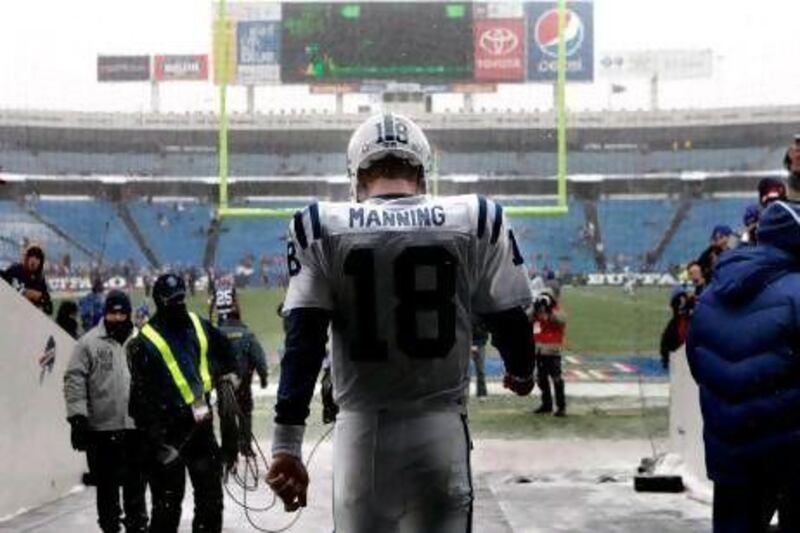A New Orleans-raised American named Peyton Manning would appear to be relocating. He will seek another city after 13 years in the same job. He will bring along his family.
I know: big deal. People relocate all the time. People finish 13-year stints in jobs all the time. Everything comes to an end. Everything.
So why does this seem so jarring, this man moving to wherever? Well, here's another case of the strange phenomenon in which certain athletes become so identified with certain cities that they almost seem to join the skyline. Moving them seems like moving a multi-story building, even though, for the record, it's much easier.
This probably has dated to the early stages of human history, way back when Russell Crowe dominated the landscape in Rome.
For 13 seasons that seemed even longer, Peyton Manning became a part of the middle American city of Indianapolis, once famous principally for a car race. His routine pantomime became part of the American Sunday. He would come to the line of scrimmage in the no-huddle offence, gesticulate and call out signals left and right.
He would not so much dominate defences as incise them, earning comparisons to surgeons even though the latter face umpteen times more pressure.
For 208 consecutive starts, beyond-rare in a sport with 16 games per season and roughness both necessary and unnecessary, this happened in Indianapolis, in the blue-and-white uniform of the Colts. On him, that No 18 uniform always seemed so ... clean. His presence became so embedded in the NFL-viewing experience that when the word leaked on Tuesday that the Colts and Manning would part ways, we came upon a melancholy corollary.
Manning, 36 later this month, might wear a uniform of another colour next autumn, and that's just going to look weird.
Where another mainstay, Brett Favre, always carried a tinge of maverick to him, and sometimes threw wildly, and won big more early than late in his career, Manning was the affable technocrat, and always threw precisely, and won more late than early - through years of painstaking failure. It made him seem more entrenched.
He seemed to treat everyone respectfully, and his commercials displayed a fine wry humour, and after a while, you could want him to win even if you did not care about his team. You also could wonder if he ever would.
Twice in three years amid the last decade, the Colts lost to the New England Patriots in the play-offs, scoring only three points the second time. Towering regular seasons fizzled in play-offs. A 13-0 start leaning toward 16-0 in 2005 became a 14-3 downer, ending in a kooky play-off when No 6-seeded Pittsburgh beat the top-seeded Colts in Indianapolis, the curtain dropping with a botched field goal and a Manning grimace.
Even the neutral could feel as if amid some captivating multi-year narrative, hoping for the right ending. It came on a night of microcosm in January 2007. The Patriots led the AFC title game 21-3 after Assante Samuel returned an interception of Manning 39 yards for a touchdown not long before half time.
From there, Manning and the Colts amassed most of their 455 total yards and 32 first downs in the largest comeback in any conference-championship game, winning 38-34 with an 80-yard drive in a minute and 17 seconds, concluding with exactly one minute left, a finish that could send you into a London street at 4am wide awake.
And from there, Indianapolis would be superior to Chicago in the Super Bowl.
The long saga had ended justly.
Manning's stature blossomed even from there, until on November 15, 2009, in Indianapolis, the long-dreaded New England coach Bill Belichick revealed a startling fear of Manning. On fourth down with two minutes left and a 34-28 lead, he declined to punt and wound up pilloried by witnesses when his fourth-down play flopped and Indianapolis devoured a short field to go 29 yards to win.
In a return Super Bowl visit that season, a trek even more commanding than before, the Colts lost to New Orleans, a late Manning interception crucial. By then, though, he had enough gold stars - and 54,828 passing yards, and 399 touchdown passes - to occlude even that big glitch.
Injured, he missed last season. Uncertain, the Colts looked at the cold contract numbers and the health questions and breached sentiment. This day always looms possible up the pike, but by the time it came nobody could picture Manning anywhere else. Curiously, the business of sport provides escape from the cold realities of business, so that when business resurfaces after a long, good plot like this, it jolts.





